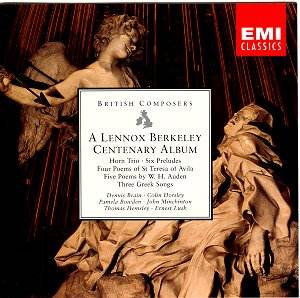This thoughtfully assembled compilation brings
together recordings made over a period of more than forty years,
and features performances by many of the finest musicians working
in post-war Britain. It also acts as an excellent introduction
to the music of this meticulous and versatile composer, the centenary
of whose birth fall this year (2003). Such celebrations can seem
contrived or unnecessary; but in Berkeley’s case, they act as
a valuable forum in which to re-evaluate his impressively rich
and wide-ranging output.
One critic has called him "the leading Francophile
amongst British musicians", and there is indeed a certain
‘French polish’ about his music (with apologies to RVW who coined
that usage!). Yet it is also profoundly and unmistakably English,
and has close links with Britten, Tippett and Finzi, to name but
three. It is very personal stuff, with a little built-in emotional
reticence. That in itself is very English, of course, but it does
mean that the music doesn’t always reach out and grab you in quite
the way that of some of his contemporaries can do. But it generously
rewards repeated hearings, for this music is full of character,
as well as being superbly crafted.
The first piece on the disc, the Horn Trio, is
a fine example of this. Much more than a mere ‘companion piece’
to the great Brahms work for this medium, the trio has what might
look, on paper, to be an unbalanced structure. There are three
movements, starting with an energetic allegro, called to
action by boldly rising fourths in the horn part. Then there is
a brooding and very beautiful Lento, leading to the finale, a
theme and ten variations on a relaxed, playful theme, whose diffident
descending seventh seems the antithesis of the striding fourths
of the first movement. The variations are resourceful and entertaining,
and, despite the apparently lop-sided structure, the whole work
is perfectly judged. Brain, Parikian and Horsley give a masterly
performance, and the recording from 1954 sounds as fresh as a
daisy.
Pianists who have not come across the Preludes
have a treat in store – these slight works are a delight, perhaps
the most memorable being the final Andante with its gentle
Siciliana rhythm. The Four Poems of St.Teresa of Avila
are sung with engaging sincerity by Pamela Bowden, her rich contralto
voice making the third of the songs, Let mine eyes see thee,
sweet Jesus of Nazareth a profound experience – I cannot imagine
a more affecting setting of these moving words. The string playing
by the Collegium Musicum is quite outstanding.
And what a joy to have Thomas Hemsley, that fine
baritone, at his absolute peak, in two groups of Berkeley songs.
It was particularly interesting to compare his version of the
Auden Poems with that of Philip Langridge, whose re-issue on Naxos
I reviewed last month. It’s impressive that Hemsley is certainly
a match for Langridge in his sensitivity to the texts and to their
characterisation in the music. Maybe Langridge spins an even more
sustained line in Eyes look into the well; but these are
deeply felt imaginative responses from Hemsley, and his inimitable
voice is perfectly captured by the recording.
The 1934 Polka, one of Three Pieces for
Two Pianos, op. 5, shows Berkeley early on in a mischievous style,
much influenced by Les Six. The ‘wrong-note’ jokes also remind
one inescapably of the Shostakovich of the Age of Gold polka.
Cyril Smith and Phyllis Sellick were a talented piano duo, though
Smith tragically lost the use of one arm after a stroke. Undeterred,
they not only took large swathes of the piano-duet and two-piano
repertoire and adapted them for three hands, but also commissioned
a number of works from important composers. Their performance
of this brief Polka is appropriately scintillating and witty.
Two lovely short choral works complete the disc.
A young Andrew Davis makes a cameo appearance as the organist
in the tranquil carol I sing of a maiden. The Lord is
my Shepherd is more extended, but is still a model of concision.
In both pieces, the choir of King’s College Cambridge sings as
beautifully as you would expect, even though twenty-six years
separates the two recordings; some things never seem to change,
happily! The outstanding treble soloist in the latter work is
Thomas Rose.
This is a deeply satisfying disc, and I came
from it thinking that Berkeley was an even better composer than
I realised – which must have been one of the aims in its production.
This is a major contribution to the centenary celebrations of
one of our finest composers.
Gwyn Parry-Jones

